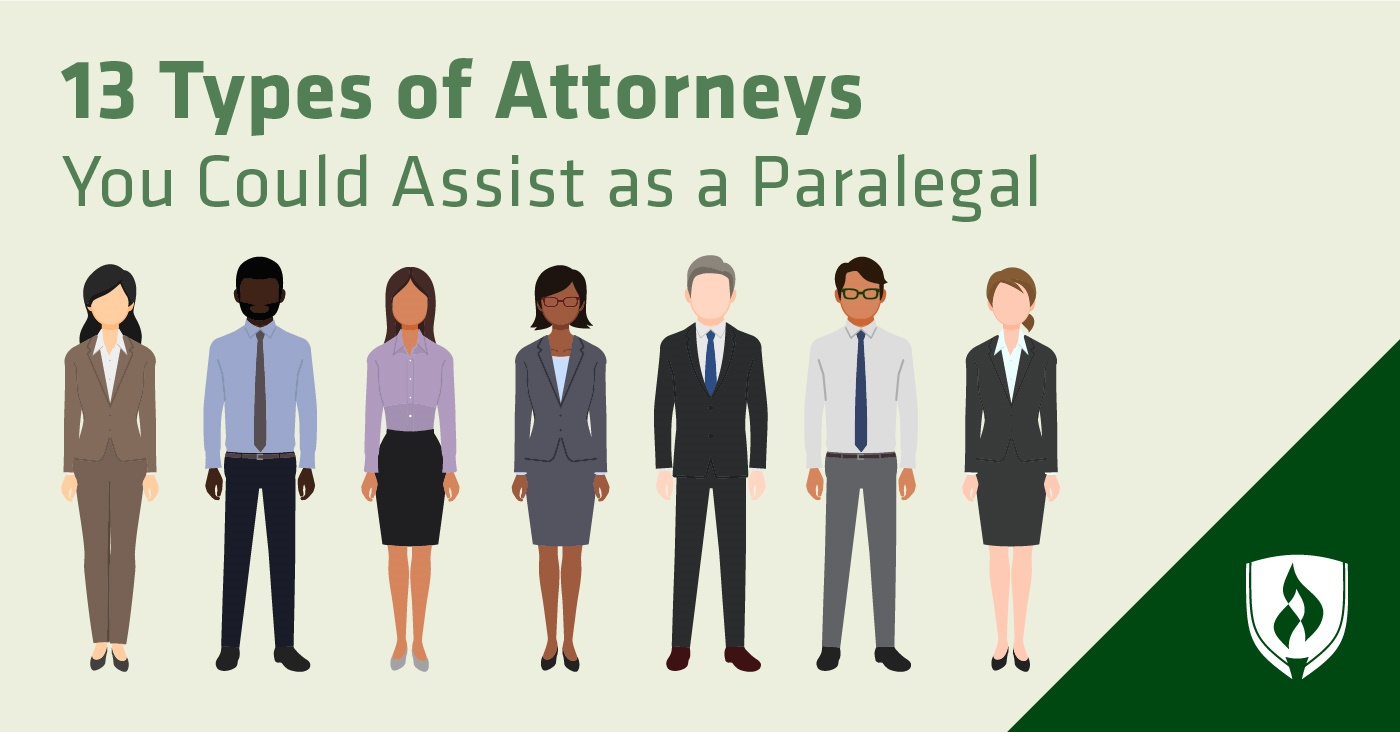
Paralegals fulfill a critical role in the legal system. These professionals provide high-level research, administrative and organizational support to attorneys, among other important tasks. While the fundamentals of their work will remain consistent, the type of attorney or organization a paralegal works for can influence their responsibilities.
So what types of attorney could you potentially end up working for? While criminal defense attorneys often capture the spotlight when it comes to media portrayals, they’re not the only show in town. There are specialized legal professionals covering a wide array of legal focus areas. Those roles can be interesting in their own right, even if they’re not always front and center on your television.
In this article, we’ll take a closer look at 13 different types of attorneys you could end up working with as a paralegal.
Examining 13 different types of attorneys you may work with in a paralegal career
Curious about what types of legal cases you could be focused on while working as paralegal? Here’s a primer on some common options.
1. Tax attorney
Odds are you know firsthand how complicated the details of filing taxes can become. Tax law covers the federal, state and municipal governments’ assessment and collection of taxes from individuals and corporations. Tax attorneys are experts in tax law and may work in a large firm, an accounting office or for a government agency. Tax attorneys are an incredibly valuable asset for their clients, as are the paralegals who work closely with them.
2. Malpractice attorney
“Malpractice” refers to specific kinds of professional misconduct. Malpractice attorneys work on behalf of individuals, organizations or groups to bring professionals who have committed malpractice to justice and obtain fair compensation for their clients. Malpractice attorneys often specialize in medical malpractice, focusing on issues related to misdiagnoses, surgical errors or birth injuries.
3. Personal injury attorney
Personal injury attorneys have some overlap with malpractice attorneys in that they represent clients who have been physically or psychologically injured by another party. However, malpractice cases require those injuries to have been obtained by a professional’s failure to fulfill the basic tenants of their job, while personal injury attorneys work with clients who have been injured by any other parties through any kind of negligence. Personal injury attorneys do not often charge their clients an hourly rate but receive a percentage of their clients’ compensation from the other party (known as “damages”).
4. Criminal defense attorney
Criminal defense attorneys are one of the most recognizable types of attorneys thanks to television shows like Law and Order and Scandal. There are many kinds of criminal defense attorneys; some work with a few high-profile clients while others work as public defenders with a wide range of clients. The goal of their job is simple: provide a strong defense for their clients and look out for their best interests.
5. Estate planning attorney
The death of a loved one is always a challenge, so estate planning attorneys work with clients to set up clear plans for how a person’s estate will be inventoried, valued, dispersed and taxed after their death. The work of an estate attorney may seem a little morbid, but these professionals offer an invaluable service to grieving families and individuals looking for peace of mind about the state of their loved ones and their possessions after they can no longer handle their affairs for themselves.
6. Bankruptcy attorney
It is possible to file for bankruptcy without an attorney, but given the high stakes and complexity of declaring that you can no longer pay your debts, it is strongly advised that individuals facing this challenging reality consult bankruptcy attorneys to ensure the process is handled correctly. Bankruptcy attorneys work with clients during one of the most challenging moments of their lives, and they are often able to give those clients hope and a means to move forward.
7. Intellectual property attorney
Intellectual property law is a complex and nuanced field covering the legal claims to inventions, designs, works of art and more. Intellectual property attorneys may work in-house at large corporations, at firms specializing in intellectual property or with individual clients. Attorneys in the role seek to ensure their clients’ hard work is protected by helping them prepare the paperwork needed for filing patents and trademark claims, and they will advise clients in situations where they suspect someone is unfairly using their intellectual property.
8. Immigration attorney
Immigration law is complex, evolving and often intertwined with political and cultural dynamics. Immigration attorneys work with clients navigating the process of becoming United States citizens for a myriad of reasons, including finding safety from life-threatening realities in their home countries, gaining work opportunities, exploring educational interests and more. They may focus on helping clients by representing them during immigration hearings, fighting deportation orders and by assisting with measures needed to maintain good standing as a candidate for citizenship.
9. Environmental attorney
Like immigration, environmental law and policies are dynamic and culturally relevant. Environmental attorneys may work for environmental interest groups or they might work for private firms or within academia. Environmental attorneys often work with clients on issues involving renewable energy, sustainability, and environmental regulations. Want to delve deeper into the field? Learn more in our article, "what is environmental law?".
10. Workers’ compensation attorney
If you or a loved one have ever needed a workers’ compensation attorney, you know these attorneys significantly impact their clients’ lives. In a situation where a person is injured at work and requires financial assistance to cover the cost of medical care or lost wages, a workers’ compensation attorney can help that person receive the financial assistance they need. Like a personal injury attorney, workers’ compensation attorneys are usually paid with a percentage of their clients’ benefits.
11. Contract attorney
These attorneys are experts in contract law, a pillar of the legal system in the United States. At its most basic level, contract law is focused on the details of any agreement between two parties. These agreements might be between a company and its investors or a company and its employees. When people’s livelihoods depend on the specifics of these contracts, the details of contract law become very complex and critically important.
12. Constitutional law attorney
The United States Constitution outlines the power of the United States government. While it may seem like a cut-and-dried subject, there is actually quite a bit that isn’t neatly resolved or addressed in the document—and that’s where constitutional law comes into play. Constitutional law interprets and applies the Constitution. Constitutional law attorneys might work with civil rights cases, public policy or lobbying organizations.
13. Family attorney
The work of a family attorney is at the intersection of state and federal laws and their clients’ personal lives. Family attorneys often focus their work on divorce and the potentially messy legal ramifications of that decision, but that’s not all. They may also assist with adoption cases, surrogacy claims, resolving domestic disputes and more. As you might expect, these attorneys work with clients who are often facing extremely challenging and sensitive moments in their private lives and need an experienced representative to help protect their interests.
Ready to start your paralegal career?
While the specific types of cases you could work on as a paralegal will vary based on the type of attorney you're working for, the good news is that many of the responsibilities will remain the same. A properly-educated paralegal can find opportunities working for attorneys across the legal spectrum—so what’s stopping you? Start planning your path ahead with our article, “How to Become a Paralegal: 4 Steps to Start Your Legal Career."




